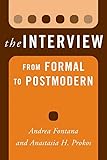The interview: from formal to postmodern / Andrea Fontana and Anastasia H. Prokos
Por: Fontana, Andrea [autor/a].
Prokos, Anastasia H [autor/a].
Tipo de material: Libro
impreso(a)
Series Editor: Walnut Creek, California: Left Coast Press, 2007Descripción: 148 páginas ; 23 centímetros.ISBN: 9781598741094.Tema(s): Entrevistas
Libro
impreso(a)
Series Editor: Walnut Creek, California: Left Coast Press, 2007Descripción: 148 páginas ; 23 centímetros.ISBN: 9781598741094.Tema(s): Entrevistas| Tipo de ítem | Biblioteca actual | Colección | Signatura | Estado | Fecha de vencimiento | Código de barras |
|---|---|---|---|---|---|---|
| Libros |
Biblioteca San Cristóbal
Texto en la configuración de la biblioteca San Cristóbal |
Acervo General | 158.39 F6 | Disponible | ECO010015437 |
Incluye bibliografía: páginas 123-140 e índice: páginas 141-146
Glosario: páginas 115-121
Preface.. 1. Interviewing in perspective.. The interview society.. The history of Interviewing.. 2. Structured interviewing.. 3. Group interviewing.. 4. Unstructured interviewing.. Accessing the setting.. Understanding the language and culture of the respondents.. Deciding how to present oneself.. Locating an informant.. Gaining trust.. Establishing rapport.. Collecting empirical material.. 5. Types of unstructured interviewing.. Oral history.. Creative interviewing.. Postmodern interviewing.. Grounded theory and the Interview.. Gender and interviewing.. 6. Framing and interpreting Interviews.. Framing interviews.. Interpreting interviews.. 7. Ethical Considerations.. 8. New trends in interviewing.. The interview as a negotiated accomplishment.. Empathetic interviewing.. The problematics of new approaches.. 9. Future directions.. Formal interviews.. Group interviews.. Unstructured interviews.. Electronic interviewing.. Conclusion.. Glossary.. References.. Index.. About the Authors
Used by everyone from survey researchers to oral historians, the interview may be the most basic and essential field method in the qualitative researcher's toolkit. In this concise, student-friendly guide, Fontana and Prokos give a cogent introduction to the history, types, and methods of interviewing in the social sciences. They outline the range of ways in which interviews are conducted, both structured and unstructured, then provide instruction on conducting and interpreting interviews, and address ethical considerations in eliciting information from people. The authors also point to recent and future trends that will affect the use of this method. For researchers who need a primer and for students in methods courses or assigned fieldwork projects in other courses across the social sciences, this short, inexpensive volume is ideal. eng
